Argentina
En la Argentina se conmemoró el 31 aniversario del atentado a la Embajada de Israel
A la conmemoración asistieron funcionarios del Gobierno nacional y municipal. Fue presidida por el embajador Sela y autoridades de la Cancillería israelí.
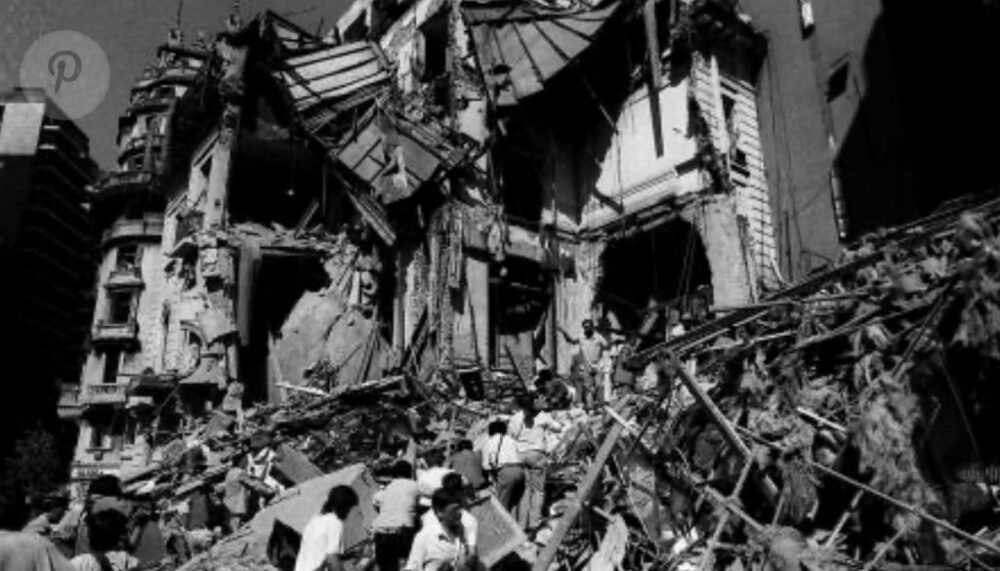
Agencia AJN.- En la emblemática esquina de Arroyo y Suipacha, en la Ciudad de Buenos Aires, se llevó a cabo esta tarde el acto central por el 31 aniversario del atentado a la Embajada de Israel en Argentina. A la conmemoración asistieron funcionarios del Gobierno nacional y municipal. Fue presidida por el embajador Sela y autoridades de la Cancillería israelí.
El ministro de Justicia y Derechos Humanos argentino, Martín Soria, uno de los oradores principales del acto, expresó: ‘‘Hoy venimos a acompañarlos a ustedes, que son un ejemplo de perseverancia y de haber mantenido viva la presencia de sus familiares que jamás olvidaremos. Hoy venimos con el recuerdo de que el año pasado, en este mismo lugar, conversamos sobre la hermandad de nuestros pueblos y de este camino en común que nos llevó a ambos pueblos a incorporar a la memoria como un elemento central de nuestras sociedades’’.
‘‘La memoria debe ir siempre acompañada de la verdad y la justicia. Los pueblos sin memoria están condenados a repetir su pasado de la misma manera que en un pueblo y en una sociedad sin justicia los crímenes pueden volver a repetirse, algo que sucedió en la Argentina. Debemos partir de la base necesaria que es la responsabilidad del Estado nacional argentino: responsable por no haber podido prevenir este atentado, responsable por no haber investigado correctamente y responsable de no haber juzgado y castigado a los culpables. Es esa responsabilidad la que permitió que nuestros pueblos vuelvan a ser víctimas de un nuevo atentado, esta vez contra la sede de la AMIA, apenas dos años después de este atentado criminal contra la Embajada de Israel en Argentina’’, agregó Soria.
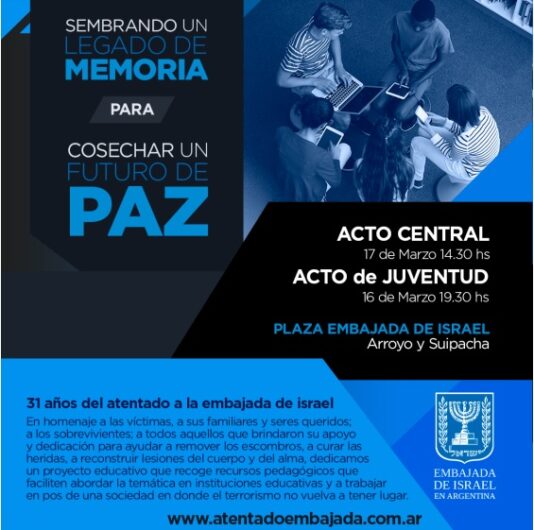
A la hora de hablar de los culpables, el ministro de Justicia fue claro: ‘‘Todos lo sabemos, la responsabilidad de Hezbollah y la falta de cooperación de la República Islámica de Irán para encontrar a los culpables son dos hechos que merecen el mayor de los repudios de parte de nuestro país. Ambos atentados tuvieron sin lugar a dudas la misma motivación, el odio al pueblo de Israel y la implantación del terror, así lo dictaminó la Corte Suprema en el año 1999, hace más de dos décadas atrás, en casi en el único avance que lamentablemente tuvo la investigación a lo largo de todo este tiempo’’.
‘‘La República Argentina condena al terrorismo en todas sus formas, los actos terroristas amenazan la paz y la consolidación de la democracia. Por eso hacemos y seguiremos haciendo todo lo que está a nuestro alcance. Sabemos que no es suficiente, pero es necesario que todos y cada uno de los que tenemos esa responsabilidad hagamos nuestros máximos esfuerzos por esta causa. Lamentablemente seguimos sintiendo que en algunos poderes esto no es así. La Torá ordena ‘justicia, justicia perseguirás’, esa búsqueda de justicia presente en cualquier orden moral, religioso o jurídico, debe ser nuestra propia guía, nuestra propia luz que nos permita atravesar la oscuridad que siempre genera la impunidad’’, concluyó Soria.
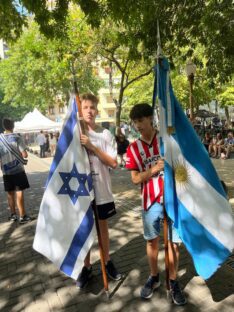
Jóvenes de las escuelas de la red escolar de la comunidad judía.
El embajador de Israel en Argentina, Eyal Sela, el otro orador principal del evento, señaló que ‘‘‘no hay razón que pueda justificar un ataque contra civiles. El ataque siempre fue y será un crimen no importa cuál sea su meta o razón’, esta frase es una traducción literal de un discurso pronunciado en 1989 en la ONU por David Ben Rafael, diplomático israelí que fue asesinado en esta esquina hace 31 años’’.
‘‘Hace 31 años un Ford F100 pasó por dónde ustedes están parados, llevándose consigo vidas de personas inocentes. Un acto es terrorista cuando los daños a los civiles y a la población común se vuelve el objetivo’’, recordó el embajador israelí.
Sela aseguró que como representante del Estado de Israel no puede »dejar de subrayar la importancia de mantener abiertos los canales nacionales e internacionales que permitan prevenir, identificar y condenar a los países que apoyan y financian a agrupaciones terroristas como Hezbollah».

Finalmente, el embajador israelí concluyó: ‘‘Pasaron 31 años. No puedo ni siquiera pensar ni imaginar lo difícil que resultan estos días, meses, años y décadas de ausencia y silencios para los seres cercanos de aquellos que fueron asesinados aquí. Los sobrevivientes perdieron una parte de sus vidas entre los escombros de lo que fue esta embajada. A ellos mi respeto. Nos debemos a todos, pero especialmente a los sobrevivientes y a los familiares de las víctimas’’.
El acto se realizó para homenajear a las 29 víctimas fatales y los más de 200 heridos en el ataque de Hezbollah, en el mismo lugar en el que explotó la sede diplomática en 1992.
A pesar del tiempo transcurrido, la causa judicial no tiene condenados ni detenidos.
El evento comenzó a las 14:45 horas con el tradicional sonido de las sirenas. Luego se escucharon los himnos de Argentina e Israel y se cantó Kanfei Ruaj, “Alas del espíritu” del gran Rabino Cook, interpretada por la cantante Tali Lubieniecki acompañada por el pianista Dany Cukierman, y la flautista Inbal Sela.
A continuación se entregaron diferentes ofrendas florales:
En nombre del Estado de Israel, el embajador Sela junto al general adjunto de la Cancillería israelí, Jonathan Peled, acompañados por un familiar de una de las víctimas.
En nombre del Estado argentino, el ministro de Justicia Soria y el ministro de Educación Perczyk, junto a un familiar de una de las víctimas.
En nombre de la Ciudad de Buenos Aires, el ministro de Gobierno Macri junto al ministro de Relaciones Exteriores Straface, acompañados de un familiar de una de las víctimas.
En nombre de las Fuerzas de Defensa y Seguridad de Israel y Argentina, el agregado militar Coronel Avinoam Frenkel y el comisario general Jefe de Policía Federal Carlos Hernández, junto a un sobreviviente del atentado.
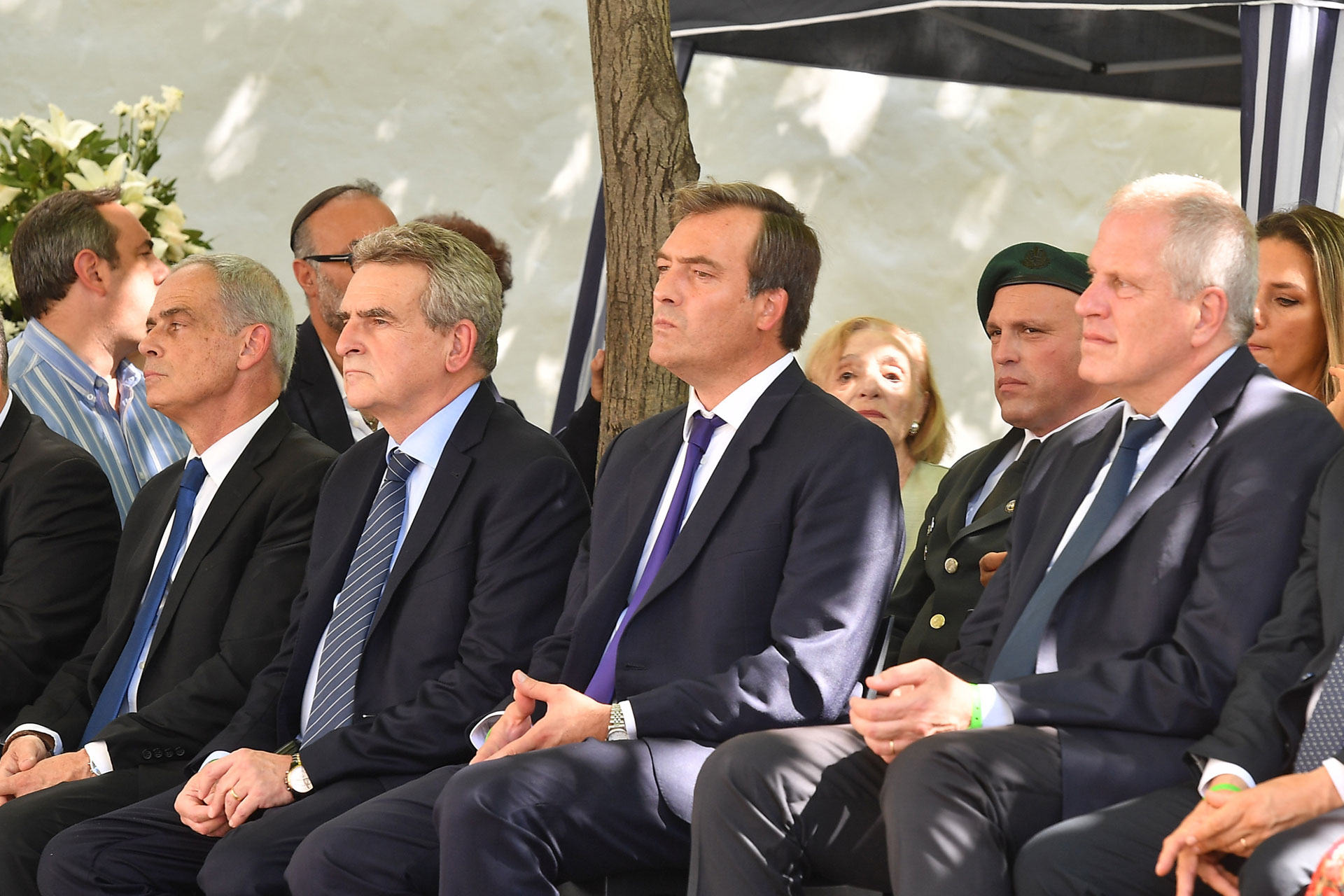
El director general para América Latina y el Caribe de la Cancillería israelí, Jonathan Peled; junto a Agustín Rossi, Martín Soria y Jaime Perzcyc (Maximiliano Luna – Infobae)
En nombre de las Organizaciones Israelíes en Argentina, el vicedirector de la Agencia Judía Mundial, Yehuda Setton y el presidente del Keren Kayemet LeIsrael, Daniel Lew, junto a un familiar de una de las víctimas.
En nombre de los familiares, Maximiliano Lanzeri, hijo de una de las víctimas fatales del atentado.
En nombre de la comunidad judía, el presidente de la AMIA, Amos Linetzky y el vicepresidente de la DAIA, Marcos Cohen, junto a uno de los sobrevivientes.
En nombre de todos los sobrevivientes, Alberto Kupers, junto a un familiar de una de las víctimas.
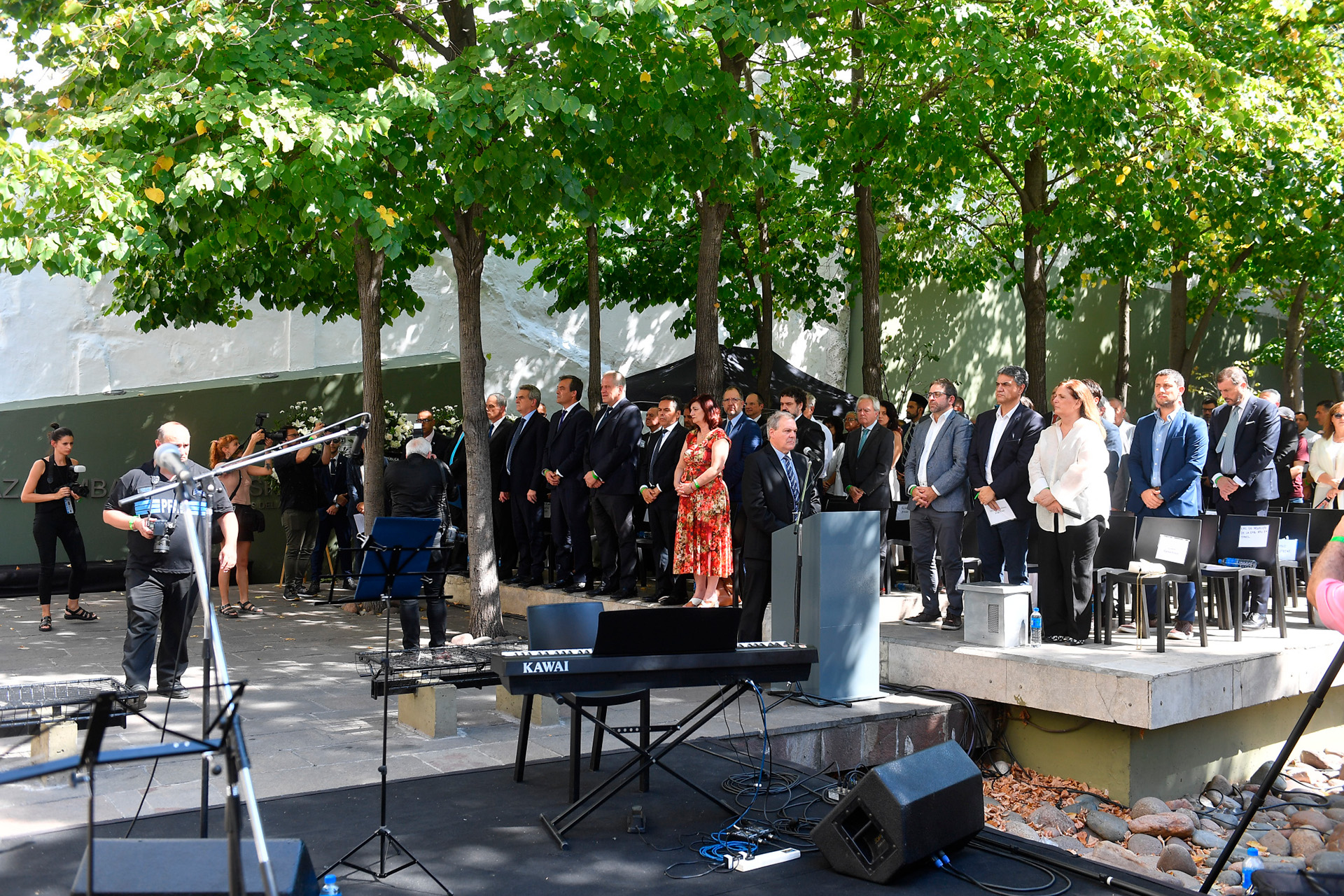
Tras las ofrendas, el Rabino Sacca hizo un kaddish en honor a los fallecidos.
Luego, el Obispo Ojea, presidente de la Conferencia Episcopal Argentina, dijo una oración en la que afirmó que ‘‘el diálogo es el único idioma entre los pueblos’’.
»Esperamos que este sacrificio no haya sido inútil. Es un buen momento para recordar al sacerdote que murió en el atentado y trabajaba aquí enfrente’’, agregó Ojea.
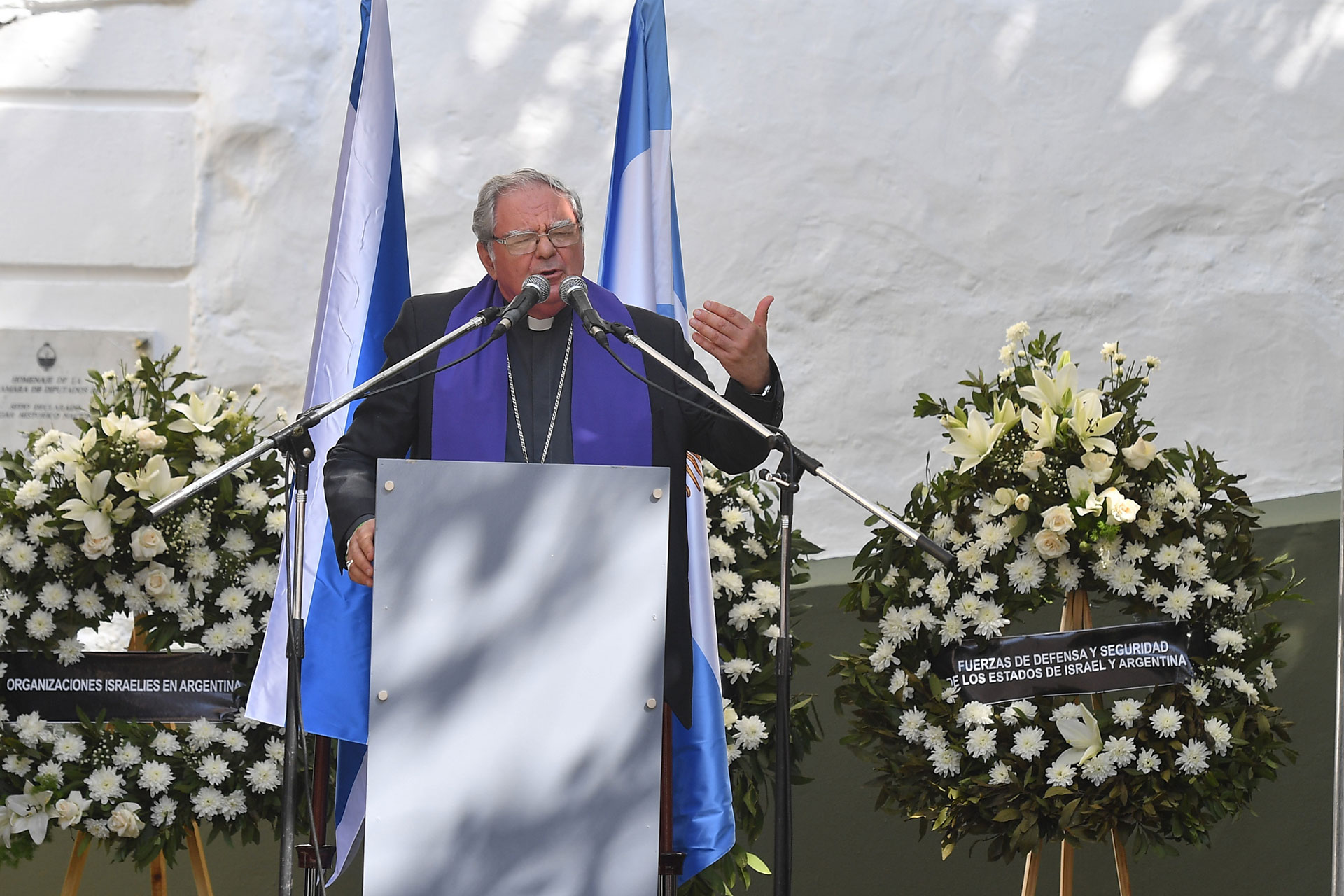
Monseñor Ojea, representante de la Iglesia (Maximiliano Luna – Infobae)
Estuvieron presentes también, entre otros, el director general para América Latina y el Caribe de la Cancillería israelí, Jonathan Peled; el ministro de Educación, Jaime Perczyk; el ministro de Defensa, Jorge Taiana; la ministra de Trabajo, Kelly Olmos; el jefe de Gabinete, Agustín Rossi; el secretario de Relaciones Exteriores, Pablo Tettamanti; la senadora Carolina Losada; los diputados nacionales Facundo Manes y Juan Manuel López; el exsenador Federico Pinedo; el ministro de Gobierno de la Ciudad de Buenos Aires, Jorge Macri; el secretario de Relaciones Internacionales de la Ciudad de Buenos Aires, Fernando Straface; miembros del Congreso de la Nación Argentina; funcionarios del Gobierno nacional, provincial y de la Ciudad de Buenos Aires; el presidente de la Conferencia Episcopal Argentina, Oscar Ojea; el Rabino Isaac Sacca; el presidente de la Cámara de Comercio Argentino Israelí, Mario Montoto; embajadores; miembros de la Policía Federal y de la Policía de la ciudad.
Argentina
Argentina | Holocaust and Heroism Day. President Milei’s major speech against anti-Semitism and terrorism
»Therefore, in keeping with our history and with what we consider to be true, we ratify today our spirit of friendship and collaboration with the State of Israel and we offer Argentina’s candidacy for the International Presidency of the IHRA», expressed Milei.
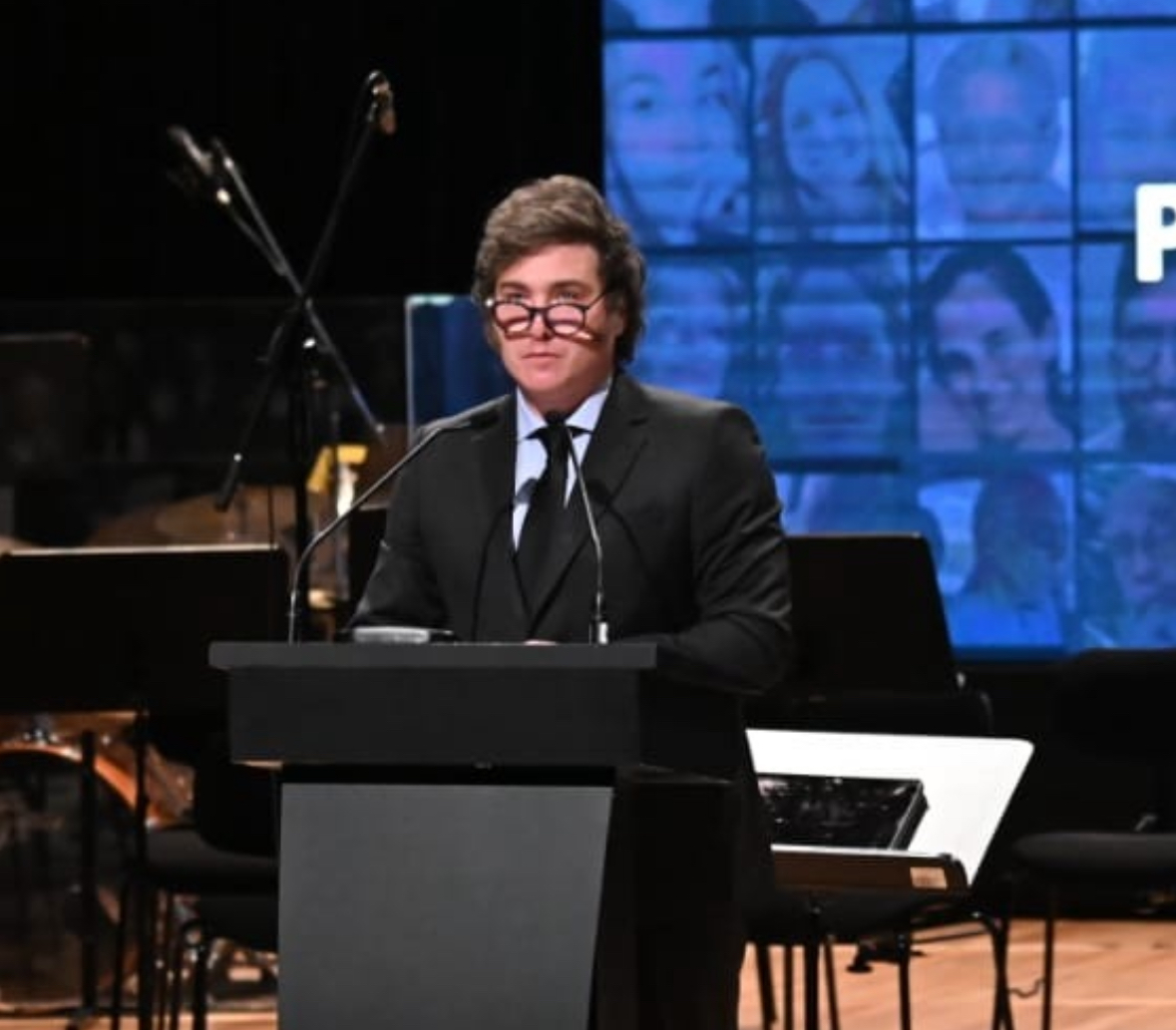
Agencia AJN.- At an event organised on Wednesday by the Delegation of Argentinean Israelite Associations (DAIA) and the Holocaust Museum of Buenos Aires to commemorate Holocaust and Heroism Day, the 81st anniversary of the Warsaw ghetto uprising, President Javier Milei announced ‘Argentina’s candidacy for the presidency of the International Holocaust Remembrance Alliance’ (IHRA).
The IHRA is an intergovernmental organisation of 35 states whose aim is to combat acts of anti-Semitism, intolerance and discrimination that can lead to genocides such as those experienced by humanity in the 20th century.
The main event was also attended by Nazi survivors, relatives of people kidnapped by Hamas, national, provincial and municipal authorities, judges, political leaders, diplomats, representatives of different religious denominations, community leaders, among others.
Argentina. Discurso y anuncio del presidente Javier Milei en el acto del Día del Holocausto organizado por el Museo del Holocausto y la DAIA @JMilei @DAIAArgentina @museoshoa #HolocaustRemembranceDay #YomHaShoah @Isaac_Herzog @AmbEyalSela @netanyahu #israel @israelmfa… pic.twitter.com/8uQVSq1inE
— Agencia AJN (@AgenciaAJN) May 9, 2024
President Milei’s full speech:
At the outset, I would like to pay tribute to Lior Rudaeff, an Argentinean living in Israel who was kidnapped and murdered by the Hamas terrorist organisation on 7 October. I would like to extend my sincere condolences to his family and loved ones, and call for the return of his body so that he can be given a proper farewell by them. Baruch Dayan Haemet to him and to all the victims of Islamic terrorism in Argentina and the world.
Today more than ever there can be no doubt that the scourge of Islamic terrorism on Israel and the Jewish people is not a problem alien to us Argentines, but one that affects us directly. First, because 21 Argentines were murdered by Hamas on that tragic day, 20 more Argentines were kidnapped and today, seven months after the attack, there are at least eight compatriots for whom we still do not know whether they are still among us or whether they have passed on to another life. Secondly, because when a battle is fought between good and evil, between freedom and oppression, between civilisation and barbarism, taking sides is not one option among others but a moral obligation.
Today we are here to remember perhaps the greatest tragedy in the history of mankind, we are doing so under the name of Holocaust and Heroism Day, and I would like to pause to discuss with you this second concept, heroism. Because I believe that the heroism and virtue of men is the flip side of tragedy, it is the only thing that can make the righteous prevail over those who seek to oppress them and rob them of their freedom. And because I believe that in times of darkness, when speaking out is costly and when the majority prefer to turn their backs on righteousness for their own convenience, promoting virtue is a commandment and a duty.
We remember today the Jewish resistance in the Warsaw ghetto, where 300,000 souls were imprisoned in inhumane conditions for three years by the Nazi regime, only to be transferred to extermination camps as we all know. We remember that one day in 1943 the prisoners took what few weapons there were and put up a fight. For 27 days they fought for their freedom, under unequal conditions and with virtually no chance of success. They fought for their freedom, which is a just cause in every time and place, and they chose to die fighting rather than be killed.
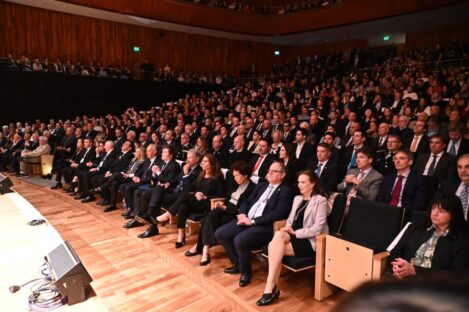
The struggle for freedom against adversaries always more powerful than themselves has been a constant in the history of the Jewish people, and has forged for them a heroic spirit, a warrior spirit. This is already clear in the sacred scriptures, it is seen in the exodus of the Jewish people from Egypt, escaping from the yoke of Pharaoh, leaving behind slavery to embrace freedom. The revolt of the Maccabees is clear when, despite being in a distinct minority, the least against the most, the weak against the powerful, they drove out the Greek invader and recaptured Jerusalem. It was never the number of soldiers that mattered, but the forces that came from heaven.
Fighting battle upon battle for over 4,000 years, though many were lost and though the temple in Jerusalem was destroyed twice, the Jewish people persisted. And today again, being under threat, surrounded by enemies who pursue a goal akin to the goal of those who imprisoned more than 300,000 souls in the ghetto 80 years ago, because the intention of Hamas on 7 October was the same as that of the Nazis, to directly and deliberately murder innocent people, if they did not do it on a larger scale, it was not because they did not want to but because they could not.
Today, we see in parallel to these sad events a recognition in the world of both intolerant Islamic fanaticism and anti-Semitism in its different versions. And to make matters worse, we see how all these phenomena are not perceived by the free world with the sharp condemnation and firm action they demand, but with discomfort and ambiguous gestures. I look around me at the rest of the leaders of the free world, especially the leaders of the great nations that should be the pillars of global freedom, and I see indifference in some and fear in others to stand on the side of truth.
Today the world is silent while there are still more than 100 hostages suffering, eight of whom are fellow Argentines. Not to mention the blatant anti-Semitism that has become commonplace on the campuses of educational institutions entrusted with the professional and human training of the West’s elites. I believe that the heroism we talk so much about and want to promote is also to defend the truth, to speak the truth when around us the truth is silenced.
That is why when the world is silent, we have an obligation to speak out, because it is the silence of the good that allows the barbarity of the bad, and because speaking out, looking straight and not turning a blind eye, even though it is difficult, even though for many it is inconvenient, is the only way to ensure that the Shoah is not repeated.
Emotivo acto del Día del Holocausto en Argentina con la presencia del presidente @JMilei organizado por @museoshoa y @DAIAArgentina.@JKnoblovits @CancilleriaARG @mondino @IsraelMFA @JonathanPeled @Isaac_Herzog @netanyahu @AmbEyalSela @LiorHaiat @BringThemHome23 #Israel pic.twitter.com/4gau1RIqiR
— Agencia AJN (@AgenciaAJN) May 9, 2024
And because God will not accept justifications or exculpations when it comes to rendering his ultimate judgement, we will not be able to tell him what, but I could not or what virtue was not convenient at the time, he will not judge us for what we thought, believed or wanted, but for having done the right thing in life. That is why today remembering the Shoah, remembering heroism and denouncing Islamic terrorism is an obligation, because without heroes we are defenceless in the face of an ever darker and longer night.
In closing I would like to thank Marcelo Mindlin, Jorge Knoblovits and the rest of the authorities of the DAIA and the Holocaust Museum for organising and inviting me to be part of this commemoration at such a difficult time for the Jewish people that demands that we all work back-to-back.
I also want to tell you that Argentina is a historic friend of the Jewish people. We were the first country in the region to recognise the existence of the State of Israel and today we proudly have the largest Jewish community in Latin America and the tenth largest in the world. Together with the Jewish community, we have suffered the cowardly attacks by the Iranian government, not only on the Jewish-Argentine community, but on the Argentinean people as a whole, which, thanks to the persistent efforts of those who seek the truth, are now, three decades later, beginning to be clarified.
Therefore, in keeping with our history and with what we consider to be true, we ratify today our spirit of friendship and collaboration with the State of Israel and we offer Argentina’s candidacy for the International Presidency of the IHRA (video), an institution whose value takes on new relevance and urgency every day, at a dark time, when the rest of the world is turning its back on Israel, they will find us at their firm side always.
Finally, and lastly, I would like to conclude with a letter from Rabbi Samson Raphael Hirsch, which seems to me to be very pertinent to the times we are living in and which should be present in our lives every day. This letter says: ‘Those who are convinced that their opinions are true and correct must express them constantly and at every opportunity with candour, and without regard to the degree of support they have and the level of opposition they will encounter. Lies need supporters to succeed; lies need the authority of majorities to fill what they lack in the rightness of their argument. Truth, on the other hand, will always win out in the end. Even if it takes time, noble, courageous and pure, expressed with all the ardour of conviction and with all the clarity of a sure conscience, expressed again and again on every occasion, it will eventually win the respect and esteem of even those who refuse to accept it. The only truth that has been lost without the possibility of regaining it is that whose possessors have not the courage to speak frankly of it. Truth was never defeated by the forces of resistance, it was only defeated when its possessors were too weak to defend it’.
Thank you very much.
Argentina
En el Día del Holocausto, Milei anunció la postulación de Argentina para la presidencia de la IHRA
Agencia AJN.- “El flagelo del terrorismo islámico sobre Israel y sobre el pueblo judío no es un problema ajeno a nosotros, los argentinos”, expresó el presidente en el acto central organizado por la DAIA y el Museo del Holocausto.
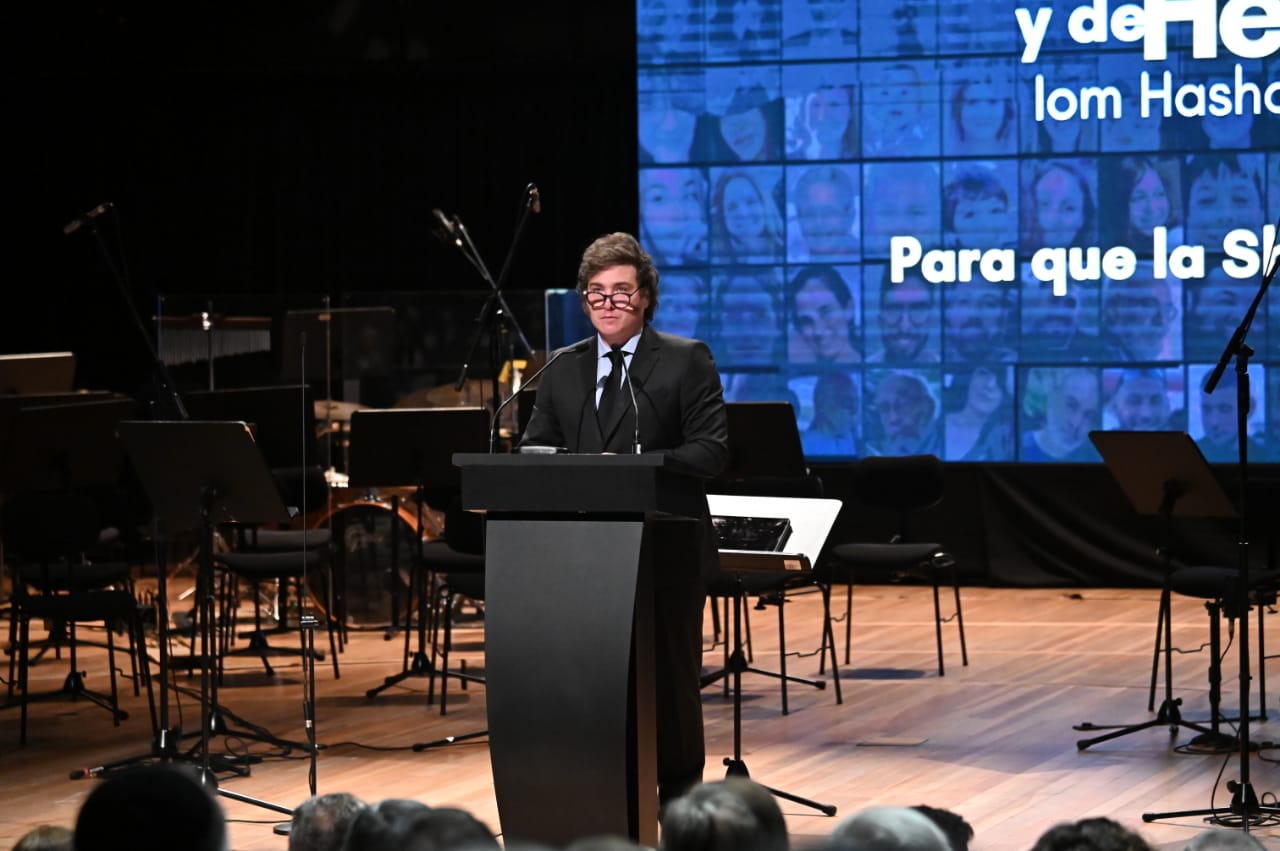
Agencia AJN.- En el acto organizado por la DAIA y el Museo del Holocausto de Buenos Aires para conmemorar el Día del Holocausto y del Heroísmo, en el 81° aniversario del levantamiento del gueto de Varsovia, el presidente Javier Milei anunció ayer en el ex Centro Cultural Kirchner (CCK) “la postulación de Argentina para la presidencia de la Alianza Internacional para el Recuerdo del Holocausto” (IHRA, por sus siglas en inglés).
Milei destacó que “cuando se libra una batalla entre el bien y el mal, entre la libertad y la opresión y entre la civilización y la barbarie, tomar partido no es una opción entre otras sino una obligación moral. Hoy estamos aquí para recordar quizás la tragedia más grande de la historia de la humanidad”. Y agregó: “Dios no va a aceptar justificación en su juicio único, no nos va a juzgar por lo que creíamos, sino por lo que hicimos. Denunciar el terrorismo islámico es una obligación».
Argentina. Discurso y anuncio del presidente Javier Milei en el acto del Día del Holocausto organizado por el Museo del Holocausto y la DAIA @JMilei @DAIAArgentina @museoshoa #HolocaustRemembranceDay #YomHaShoah @Isaac_Herzog @AmbEyalSela @netanyahu #israel @israelmfa… pic.twitter.com/8uQVSq1inE
— Agencia AJN (@AgenciaAJN) May 9, 2024
“El flagelo del terrorismo islámico sobre Israel y sobre el pueblo judío no es un problema ajeno a nosotros, los argentinos. Esto nos afecta de forma directa, primero porque 21 argentinos fueron asesinados por Hamás en aquella jornada trágica. 20 argentinos más fueron secuestrados y hoy, a 7 meses del atentado, hay al menos 8 compatriotas, para quienes seguimos desconociendo si están aún entre nosotros o han pasado a otra vida”.
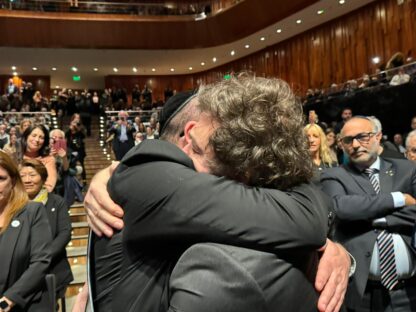
Abrazo del presidente Javier Milei con su maestro y embajador argentino en Israel, Axel Wahnish.
El presidente de la Nación advirtió que “la intención de Hamas el 7 de octubre fue la misma que la de los nazis, asesinar directa y deliberadamente gente inocente” y que “no hacer la vista gorda es la única manera de que la Shoá no se repita”.
La IHRA es una organización intergubernamental conformada por 35 Estados cuyo objetivo es luchar contra los actos de antisemitismo, intolerancia y discriminación que puedan conducir a genocidios como los vividos por la humanidad en el siglo XX.
Discurso del Presidente Javier Milei en el acto en conmemoración del Día del Holocausto y del Heroísmo. pic.twitter.com/4ePWWbuCnc
— Oficina del Presidente (@OPRArgentina) May 9, 2024
El acto central contó también con la presencia de sobrevivientes del nazismo, familiares de personas secuestradas por Hamás, autoridades nacionales, provinciales y municipales, jueces, referentes políticos, diplomáticos, representantes de distintas confesiones religiosas, dirigentes comunitarios, entre otros.
En el inicio del acto los sobrevivientes del horror nazi Mariette Diamant, Hélène Gutkowski, Claudia Piperno, Ruth Marshal, Josette Laznowski y Eva Dicker, encendieron seis velas en memoria de las 6 millones de víctimas. Néstor y Dana Chimiel, tío y prima de Iair y Eitan Horn, quienes aún se encuentran cautivos en Gaza, encendieron una vela en recordación de las personas masacradas por el grupo terrorista en octubre pasado.
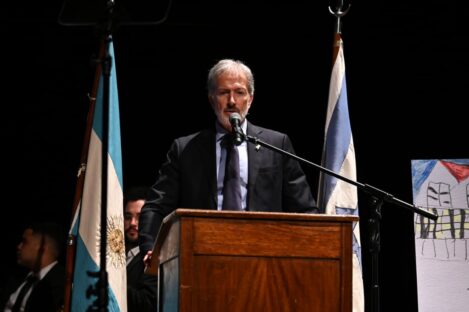
Presidente de la DAIA
En su discurso, el presidente de la DAIA, Jorge Knoblovits, recordó que «la Shoá no es un tema judío. Es un infierno abierto en el corazón de la historia», y agregó que «como en un siniestro dejá-vu, el mundo acaba de presenciar, azorado, la masacre del 7 de octubre».
«Quien se desentiende del espanto está enarbolando esa indiferencia cómplice, esa supuesta neutralidad que lo deshumaniza y lo pone del lado de los asesinos. Quien no levanta la voz y no se pone del lado de las víctimas, multiplica el crimen. Es peor todavía, porque ignora, irresponsablemente, la amenaza que está sobre su propia cabeza», afirmó el titular de la entidad representativa de la comunidad judía argentina.
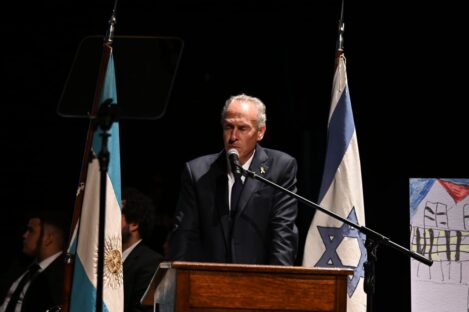
Presidente del Museo del Holocausto
Por su parte, el presidente del Museo del Holocausto, Marcelo Mindlin, ratificó «en este año tan difícil, que el Museo invita nuevamente a todos y cada uno de ustedes a realizar acciones en conjunto con cada una de las organizaciones que representan, para concientizar, para educar y para fortalecer los vínculos con todos los ámbitos de nuestra sociedad. Todos podemos hacer algo. Muchos ya lo están haciendo. Otros se han sumado en el camino. Hay mucho por hacer. Lo único que no podemos hacer, es no hacer nada. Aquí estaremos para multiplicar los esfuerzos de manera coordinada, porque las circunstancias así lo exigen».
En este marco, el cantante Juan Rodó interpretó el Himno Nacional Argentino y Hatikva, el himno nacional del Estado de Israel, acompañado por la Orquesta Sinfónica Juvenil Nacional José de San Martín y al Coro Polifónico Nacional.
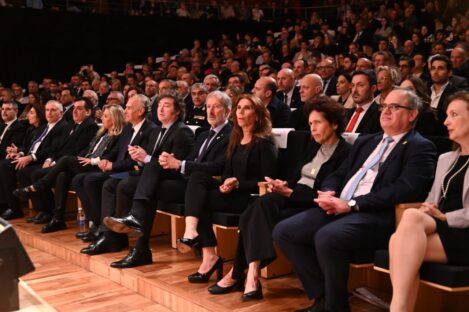
Además, frente a más de dos mil personas, el director de orquesta Ángel Mahler presentó una obertura musical dedicada a las víctimas de la Shoá y a las personas asesinadas el 7 de octubre en el ataque terrorista contra el Estado de Israel.
Durante el acto, el actor Franco Rovetta realizó una performance en homenaje al artista Marcel Marceau, «el mimo más famoso del mundo», recordado por haber salvado a cientos de niños durante la Segunda Guerra Mundial.
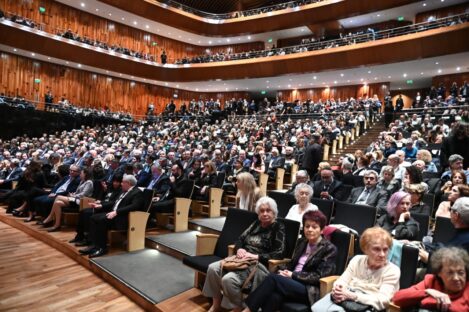
Asimismo, el sobreviviente Pedro Roth, artista plástico, fotógrafo y realizador cinematográfico nacido en Budapest, compartió su historia y el significado que el arte tiene para su vida.
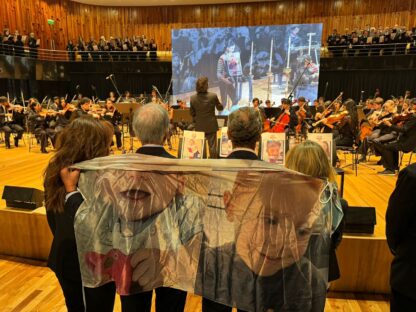
El ministro de Seguridad porteño, Waldo Wolff, entregó al presidente de la DAIA un manto con la cara de Kfir Bibas, el bebé secuestrado por Hamás
Roth subrayó que «el arte y la cultura son herramientas que me han dado la posibilidad de relatar, de vivir. A través de mis pinturas puedo contar, relatar lo sucedido. Una forma de descarga a través de lo que recuerdo. Un puente entre ese pasado y este presente. Quiero dejar un mensaje de recuerdo y resistencia. En estos tiempos del mundo tan sensibles para el pueblo judío, estar acá hoy es un acto valiente e imprescindible. Recordamos hoy a las víctimas y a los sobrevivientes que, con sus historias, mantienen viva la memoria para que nunca vuelva a suceder». Al finalizar su discurso el artista firmó uno de sus dibujos en el escenario.
La ceremonia finalizó con el cuadro musical Habaita («A casa» en hebreo), y el Himno de los Partisanos.
-
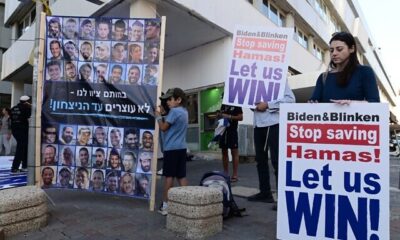
 Internacionaleshace 12 horas
Internacionaleshace 12 horasBiden es acusado de ayudar a Hamás mientras Israel está indignado por la amenaza de congelación de armas
-
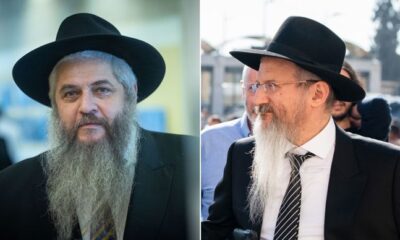
 Internacionaleshace 8 horas
Internacionaleshace 8 horasGuerra entre Rusia y Ucrania: el gran rabino de Moscú cargó con duras críticas contra su par ucraniano
-
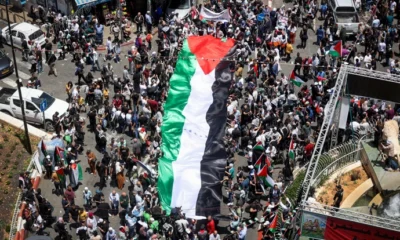
 Internacionaleshace 9 horas
Internacionaleshace 9 horasEslovenia, miembro de la Unión Europea, decidió reconocer un Estado palestino
-
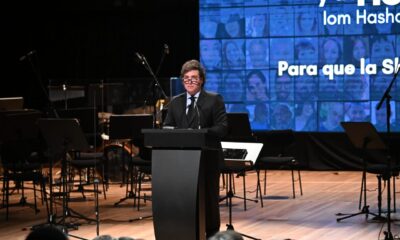
 Argentinahace 11 horas
Argentinahace 11 horasEn el Día del Holocausto, Milei anunció la postulación de Argentina para la presidencia de la IHRA
-
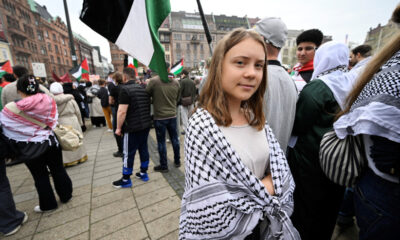
 Europa Newshace 5 horas
Europa Newshace 5 horasSuecia. La activista climática Greta Thunberg se une a las protestas pro palestinas antes de la semifinal del Eurovisión
-
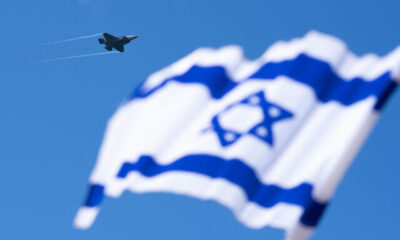
 Israelhace 11 horas
Israelhace 11 horasAntes de su 76º Día de la Independencia, la población de Israel asciende a 9,9 millones
-
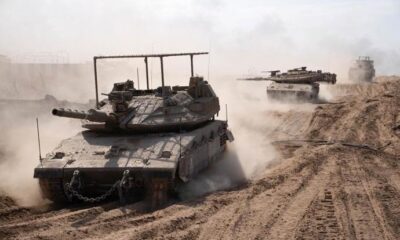
 Medio Orientehace 8 horas
Medio Orientehace 8 horasIsrael: «Retrasar los envíos de armas puede cambiar los planes operativos»
-
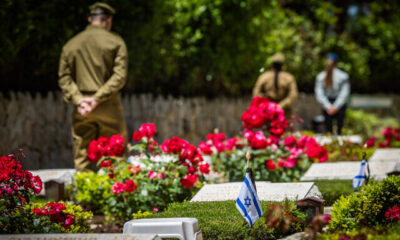
 Israelhace 9 horas
Israelhace 9 horasDía de los Caídos en Israel: 760 soldados y 834 civiles fueron asesinados en el último año






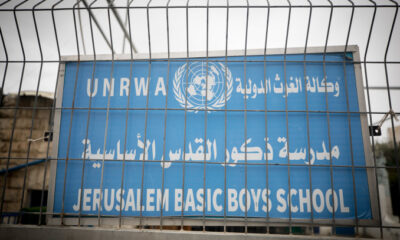

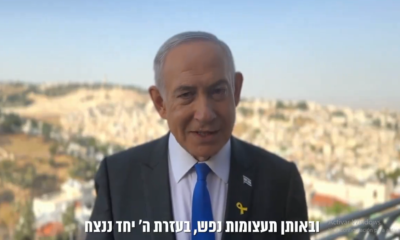

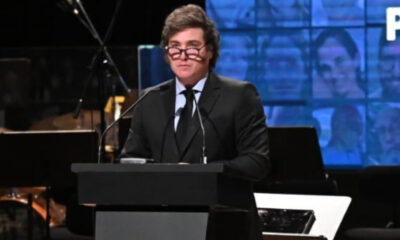

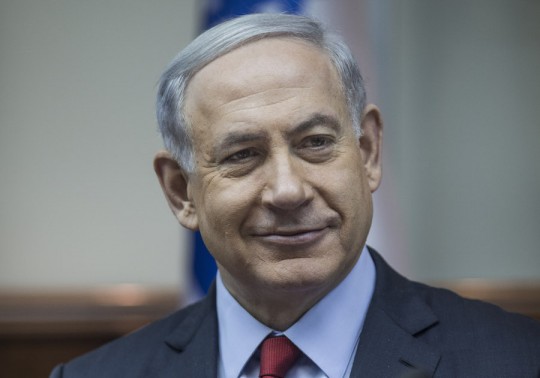






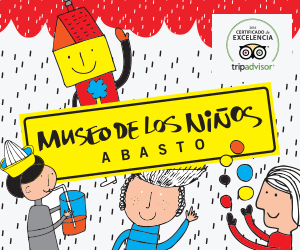
 Suscribite al Whatsapp!
Suscribite al Whatsapp!